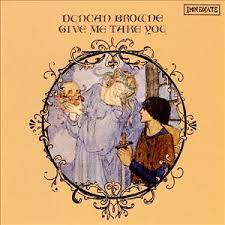DUNCAN BROWNE : GIVE ME TAKE YOU
- Give Me Take You
- Ninepence Worth Of Walking
- Dwarf In A Tree (A Cautionary Tale)
- The Ghost Walks
- Waking You (Part One)
- Chloe In The Garden
- Waking You (Part Two)
- On The Bombsite
- I Was You Weren't
- Gabilan
- Alfred Bell
- The Death Of Neil
Label : Immediate
Length : 42:36
Release Date : July 1968
Review (AllMusic) : Duncan Browne's melancholy first album, Give Me Take You - released on music impresario Andrew Loog Oldham's Immediate label in August of 1968 - is one wonderfully tender album. Many who only discovered it well after its original release compare its dulcet introspective tone to Nick Drake's albums. It does fall into a similar English folk vein, though Browne's arrangements are, on the whole, more Baroque, giving the album a semi-classical, regal feel. Browne charted his own classical arrangements and wrote out vocal charts for a choir, but turned to his art school friend David Bretton for song lyrics. It's Bretton's lovely Pre-Raphaelite-style phrases, used here in the guise of lyrical content, that fans of this album often react strongly to, one way or another. True, there's a youthful innocence and melancholy that come off as somewhat naïve-sounding, mawkish, and awkward in our modern age - "Better a tear of truth than smiling lies" is one example - but this is a minor quibble. Immediate issued only one single from the album, "On the Bombsite," but it failed to connect with listeners. At the time of its release, Oldham's Immediate Records was reportedly falling apart. He was in financial ruin and reportedly cut the sessions short to save money. Apart from a hard to find Canadian LP reissue in the mid-'70s (on which the original cover art was reproduced in tinted monochrome against a silver background), Give Me Take You was out of print for over 20 years, until 1991 when Sony Music Special Products issued a CD edition (mastered from three different vinyl sources, owing to a master tape that was missing at the time). It was reissued on CD for the first time in the U.K. by Castle Records, this time from tape sources and with five bonus tracks dating from Browne's early-'70s sessions when he was recording for the Bell label. An expanded reissue, containing rehearsal recordings, demos, and one never-finished song, appeared from Cherry Red's Grapefruit label in May of 2009.
Review (Wikipedia) : Give Me Take You is the debut studio album by English singer-songwriter and musician Duncan Browne. It was released in 1968 through Andrew Loog Oldham's Immediate Records. On the record, Browne employs a folk music sound that is informed by rock, pop, and classical elements, with baroque—inspired arrangements. The album spawned the single, "On the Bombsite," which failed to chart. Prior to his solo career, Browne was a member of the folk rock band Lorel, which was signed to Immediate Records. After their single, "A Whiter Shade of Pale", was rejected by the label, the band dissolved. Andrew Oldham, who was impressed by Browne's arrangement work for other Immediate Records acts, wanted a solo album from him. David Bretton served as a lyricist for the record and the two composed a dozen songs together. The album's commercial failure coincided with Immediate Records' financial collapse. Following the company's collapse in 1970, Browne was presented with a bill for 2,000 pounds to cover the recording cost of the album. As with most of the Immediate library, the master tapes to Browne's work for the record are considered as lost. The record was reissued mid-'70s on the Canadian-based Daffodil label. In 1991, Sony Music Special Products issued a CD edition that was mastered from three different vinyl sources, due to lost master tapes. Castle Records reissued the CD for the first time in the United Kingdom, with five bonus tracks. In 2009, Grapefruit Records released an expanded reissue, containing rehearsal recordings, demos, and an unfinished track. Despite its commercial failure, the album was received positively and gained attention, particularly from musicians from the respective music scenes at the time of its release.[clarification needed] The Village Voice critic Richard Goldstein described the record as an example of "Pre-Raphaelite Rock."[3] Billboard magazine regarded the record and its lyrics as auspicious and notable, respectively. Over the decades following its release, the album drew comparisons to the works of Paul McCartney, the Moody Blues, Van Morrison and Nick Drake. In a retrospective review, AllMusic critic Bryan Thomas described the record as "one wonderfully tender album".
